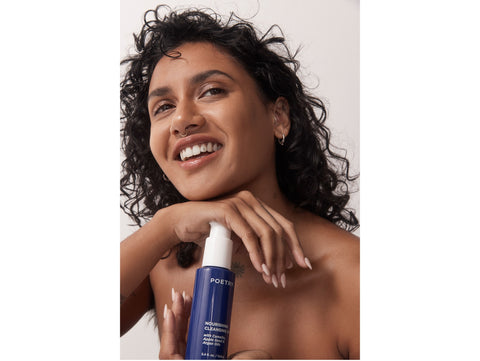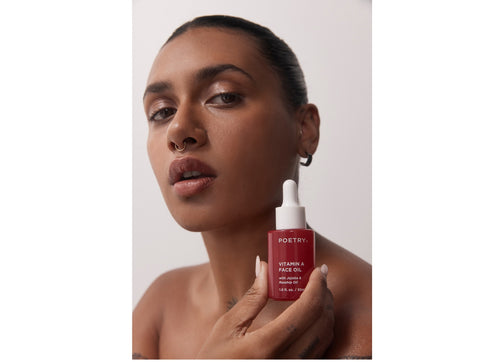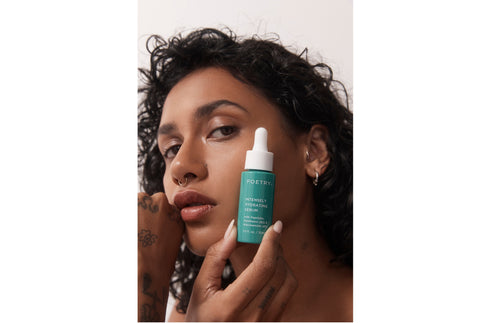There was a time when just the mention of using oils on your skin sounded like a skincare faux-pas but researchers have started highlighting the amazing benefits of oils for skin. Soothing, healing ingredients such as Camellia Oil, Sunflower Oil and Rice Bran Oil that have a long history of use around the world are enjoying a resurgence in popularity as oil cleansing for the face goes mainstream.
I have tried a lot of oil cleansers in my life and some of the main questions I get asked is "does it suit my skin type?", "how do I use it?", "will it clog my pores?", "does it really remove waterproof makeup?" and "do I need to double cleanse?"
Let's delve deeper into the world of oil cleansers and discover why you need to add one into your skincare routine.
How Do Cleansing Oils Work
Cleansing oils work with the notion of 'like dissolves like' which means they can melt away dirt, grime, sunscreen and often waterproof makeup.
In other words, putting clean, nourishing oils on your skin aims to help:
- lift excess sebum, the oily substance produced by glands on your skin
- clean out clogged pores, like blackheads and whiteheads
- remove dead skin, pollutants, and makeup
That’s why many makeup removers include oil. Oil can lift oil-free, oil-based, and waterproof formulas off your skin and lashes.
How To Use Cleansing Oils
You can apply a cleansing oil to a wet or dry face and gently massage in a circular motion then wipe face clean with a warm, wet muslin cloth. Patch testing is always recommended.
Below, explore the benefits of oil cleansing, plus find tips on adding this step to your skin care routine.
Do I Need To Double Cleanse?
Not necessarily. Double cleansing is a popular Korean tradition of using an oil cleanser and finishing off with a water-based cleanser to wash away any oily residue. This is really only necessary if you are using a full based oil cleanser that does not emulsify and wash off with water. Products such as Poetry's Nourishing Cleansing Oil emulsifies into a creamy paste with water so does not need a secondary double cleansing step.
Benefits of Oil Cleansers
Not to mention dermatologists are getting everyone excited about cleansing oils for several reasons. Here are some of the key benefits:
-
Effective at removing makeup and impurities: Cleansing oils are excellent at dissolving oil-based impurities, including makeup, dirt, and excess sebum. They can cleanse the skin more thoroughly than traditional water-based cleansers, which may not be as effective at removing these types of impurities.
-
Gentle on the skin: Many cleansing oils are formulated with natural plant-based oils that are gentle on the skin. Unlike some harsher cleansers that can strip the skin of its natural oils, cleansing oils can help to maintain the skin's natural moisture barrier, preventing dryness and irritation.
-
Suitable for all skin types: Cleansing oils can work for all skin types, including oily, acne-prone, and sensitive skin. They come in different formulas and textures, including light and non-greasy options.
-
Can help balance oil production: Contrary to popular belief, using oil-based products on oily skin can actually help to balance oil production. Cleansing oils can help to dissolve excess sebum and prevent it from building up in the pores, reducing the risk of breakouts.
-
Can improve skin texture: Regular use of cleansing oils can help to improve the texture of the skin. They can help to smooth out rough patches and leave the skin feeling soft and supple.
Research that Backs Oil Cleansing
- A 2010 study of 28 university students found evidence to suggest cleansing oil could have benefit for dry or mature-looking skin.
- A 2017 study of 60 adults and children found that bath oil, used every other day for a month, seemed to promote better skin barrier function and relieve dry skin more effectively than oil-free cleansers.
(Trusted Source)
How to Choose the Right Cleansing Oil for You
- For dry skin. Use moisturising oil such as non-comogenetic sunflower seed oil, which is rich in vitamins and antioxidants and can promote hydration.
- For sensitive skin. Steer clear of castor oil. This oil, which has antibacterial properties, acts as an astringent cleaner and can cause skin drying. Try non-comodegenic oils such as camellia oil instead.
- For oily or acne-prone skin. Argan oil which is non-comodegenic could be a good option for oily or acne-prone skin, since it may help regulate sebum production and promote clearer skin.
Overall, dermatologists are raving about cleansing oils because they are an effective and gentle way to cleanse any skin type. They can help to remove impurities and improve the overall health and appearance of the skin, making them a valuable addition to any skincare routine.






Comments (0)
There are no comments for this article. Be the first one to leave a message!